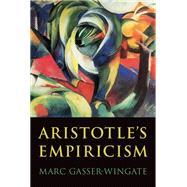Aristotle's Empiricism
, by Gasser-Wingate, Marc- ISBN: 9780197567456 | 0197567452
- Cover: Hardcover
- Copyright: 4/19/2021
Aristotle is famous for thinking that all our knowledge comes from perception. But it's not immediately clear what this view is meant to entail. It's not clear, for instance, what perception is supposed to contribute to the more advanced forms of knowledge that derive from it. Nor is it clear how we should understand the nature of its contributionówhat it might mean to say that these more advanced forms of knowledge are "derived from" or "based on" what we perceive.
Aristotle is often thought to have disappointingly little to say on these matters. Gasser-Wingate makes the case that this thought is mistaken: a coherent and philosophically attractive view of perceptual knowledge can be found in the various texts in which Aristotle discusses perception's role in animal life, the cognitive resources on which it does and does not depend, and the relation it bears to practical and theoretical modes of understanding.
Aristotle's Empiricism offers a sustained examination of these discussions and their epistemological, psychological, and ethical implications. It defends an interpretation of Aristotle as a moderate sort of empiricist, who thinks we can develop sophisticated forms of knowledge by broadly perceptual meansóand that we therefore share an important part of our cognitive lives with nonrational animalsóbut also holds that our intellectual powers allow us to surpass these animals in certain ways and thereby develop distinctively human forms of understanding.
Aristotle is often thought to have disappointingly little to say on these matters. Gasser-Wingate makes the case that this thought is mistaken: a coherent and philosophically attractive view of perceptual knowledge can be found in the various texts in which Aristotle discusses perception's role in animal life, the cognitive resources on which it does and does not depend, and the relation it bears to practical and theoretical modes of understanding.
Aristotle's Empiricism offers a sustained examination of these discussions and their epistemological, psychological, and ethical implications. It defends an interpretation of Aristotle as a moderate sort of empiricist, who thinks we can develop sophisticated forms of knowledge by broadly perceptual meansóand that we therefore share an important part of our cognitive lives with nonrational animalsóbut also holds that our intellectual powers allow us to surpass these animals in certain ways and thereby develop distinctively human forms of understanding.






